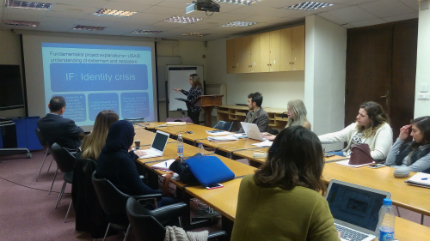ISJCR holds a Lecture with Dr. Lina Kreidie
On February 28, 2017, the Institute for Social Justice and Conflict Resolution and the Department of Social Sciences held a lecture under the title: Drivers of Islamic Fundamentalism by Dr. Lina Haddad Kreidie, Professor of Political Science at LAU and AUB.
Speaking in Dr. Imad Salamey’s graduate seminar “Communitarianism and Extremist Politics” Kreidie presented different contested definitions of fundamentalism and extremism. She contended that fundamentalists are those who follow the book literally, which might in advanced stages, lead to extremism.
She discussed her 1997 research on the theory of perspective in relation to Islamic fundamentalism posing the limitations of the rational choice theory and the appropriateness its micro as well as macro level of analysis. For Kreidie, the individual level of analysis is a major aspect in understanding Islamic fundamentalism. Perspective includes both the identity and the world view. While moderate Muslims perceive themselves as individuals and believe that reason supersedes revelation, fundamentalists view themselves as unit within the large Islamic community, the Umma, and hence view reason in terms of religious revelations.

Kreidie defines the term bounded rationality to argue that extremists’ rationality is confined by the collective identity of their group and by the limitations of their pertained ideology. She distinguished between the identity-driven interest of fundamentalists and the utility-driven interest of seculars who rely on a cost-benefit analysis and rational calculus to make decisions, unlike the fundamentalists who identify their interests with those of the collective group.
One of the most interesting information posed in the lecture was the concrete statistical correlation between the Post-Trauma Stress Disorder (PTSD) and becoming religious that Kreidie established. Her contemporary research demonstrated that 70% of Syrian refugees in Lebanon have PTSD while the percentage for Palestinians is 44%. Yet, what was astonishing was that the research found that 67% of those with PTSD became more religious. However, this finding, as iterated by Kreidie, requires further investigation.
Few of the questions asked in the discussion were concerned with the meaning of rationality and the basis under which we can assume if a decision is rational or not. Another interesting question inquired about transnational fighters and its interplay with Islam’s universal identity. In addition to a comment posed about the importance of distinguishing political motives from core religious motives, and the vitality of specifying that terrorist groups have deeply-rooted political interests and aims, and continuously arguing from a religious perspective is in fact giving their ‘cause’ legitimacy